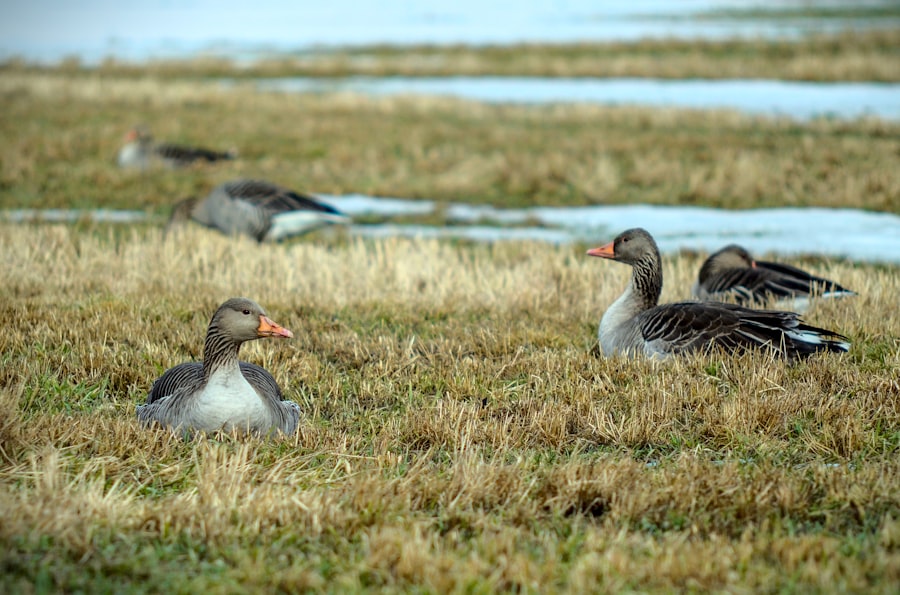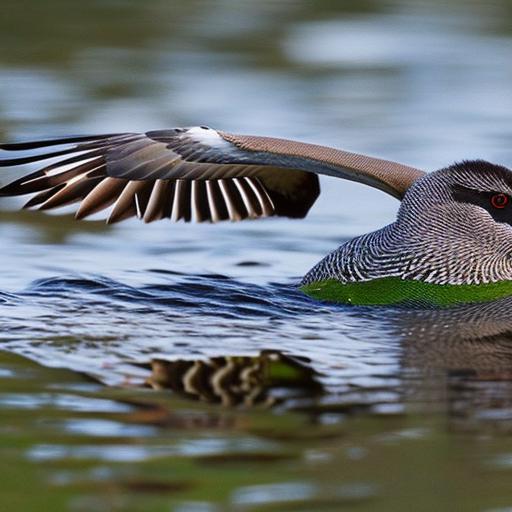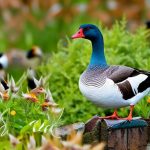Geese farming has a long history in the United Kingdom, dating back to ancient times. Geese were originally domesticated for their meat, feathers, and eggs. They were also used as guard animals, alerting farmers to potential threats. Today, keeping geese is a popular hobby and small-scale farming activity in the UK.
There are several benefits to keeping geese. Firstly, they are excellent grazers and can help maintain the health of your pasture or garden by eating weeds and insects. They also produce high-quality meat and eggs, which can be a valuable addition to your diet or a source of income if you choose to sell them. Additionally, geese are relatively low-maintenance animals and can be a fun and rewarding addition to your farm or backyard.
Key Takeaways
- Keeping geese in the UK is a rewarding and enjoyable experience for many people.
- Choosing the right breed of geese is important, as different breeds have different needs and characteristics.
- Housing and fencing requirements for geese are essential to keep them safe and healthy.
- Feeding and watering geese in the UK requires a balanced diet and access to clean water.
- Health and veterinary care for geese is important to prevent and treat illnesses and injuries.
Choosing the Right Breed of Geese for Your Needs
There are several popular breeds of geese in the UK, each with its own unique characteristics and purposes. The most common breeds include Toulouse, Embden, Chinese, and African geese.
When choosing a breed of geese, there are several factors to consider. Firstly, you should consider your specific needs and goals. If you are primarily interested in meat production, then larger breeds like Toulouse or Embden may be more suitable. If you are looking for good egg production, then Chinese or African geese may be a better choice.
Other factors to consider include the climate in your area, as some breeds are more cold-hardy than others. You should also consider the temperament of the breed, as some geese can be more aggressive or noisy than others.
Housing and Fencing Requirements for Geese
Geese require adequate housing and fencing to keep them safe and secure. There are several types of housing options for geese, including sheds, barns, or simple shelters. The housing should provide protection from predators, as well as shelter from the elements. It should also have enough space for the geese to move around comfortably.
In terms of fencing, geese require a secure enclosure to prevent them from wandering off or being attacked by predators. The fencing should be at least four feet high and made of sturdy materials, such as wire mesh or electric fencing. It should also be buried at least six inches into the ground to prevent the geese from digging under it.
To keep geese safe and secure, it is important to regularly inspect the housing and fencing for any signs of damage or wear. Additionally, providing a clean and dry environment will help prevent diseases and ensure the overall health of your geese.
Feeding and Watering Geese in the UK
Geese have specific nutritional requirements that need to be met in order for them to thrive. They require a balanced diet that includes a combination of grains, greens, and protein sources. Commercially available goose feed can be supplemented with fresh vegetables, grass, and insects.
It is important to provide geese with access to fresh water at all times. Geese require water for drinking, bathing, and digestion. A shallow pool or pond can be provided for them to swim in, but it should be cleaned regularly to prevent the spread of diseases.
Feeding geese can be done once or twice a day, depending on their age and activity level. It is important to monitor their weight and adjust their feed accordingly to prevent obesity or malnutrition.
Health and Veterinary Care for Geese
Like any other livestock, geese are susceptible to certain health issues. Common health problems in geese include respiratory infections, parasites, and foot problems. It is important to take preventative measures to maintain good health in your geese.
Regularly inspecting your geese for signs of illness or injury is crucial. If you notice any abnormal behavior or symptoms, it is important to consult with a veterinarian who specializes in avian care. They can provide guidance on proper treatment and preventative measures.
Finding a good avian veterinarian can be challenging, but it is worth the effort. Ask for recommendations from other poultry owners or do some research online to find a reputable veterinarian in your area.
Breeding and Hatching Geese in the UK

Breeding geese typically occurs during the spring months, when the days are longer and the weather is warmer. Geese are monogamous animals and will mate for life. The male goose, known as a gander, will usually choose a mate and defend her against other males.
Once the female goose, known as a goose, lays her eggs, they can be collected and placed in an incubator for hatching. The incubation period for geese is approximately 28-35 days. During this time, it is important to maintain proper temperature and humidity levels in the incubator to ensure successful hatching.
Caring for goslings requires special attention and care. They should be kept in a warm and dry environment and provided with a balanced diet that meets their nutritional needs. It is also important to socialize goslings from an early age to ensure they grow up to be friendly and well-behaved geese.
Managing Geese Behaviour and Socialisation
Understanding geese behavior is essential for successfully raising them. Geese are social animals and thrive in groups. They have a strong instinct to protect their territory and will often display aggressive behavior towards intruders.
To socialize geese, it is important to spend time with them from an early age. Hand-feeding them treats or spending time in their enclosure can help build trust and familiarity. It is also important to establish yourself as the dominant figure in their flock by using consistent training techniques.
Managing aggressive behavior in geese can be challenging but not impossible. It is important to establish boundaries and enforce them consistently. Avoiding sudden movements or loud noises can also help prevent aggressive behavior in geese.
Using Geese for Pest Control in the UK
Geese can be an effective and natural way to control pests on your property. They are excellent grazers and will eat a variety of insects, weeds, and grasses. They can help control pests such as slugs, snails, and grasshoppers.
To train geese for pest control, it is important to introduce them to the area you want them to graze gradually. Start by fencing off a small area and gradually expand it as they become more familiar with their surroundings. It is also important to provide them with supplemental feed to ensure they are getting all the nutrients they need.
Selling Geese and Their Products in the UK
If you have a surplus of geese or their products, there are several options for selling them in the UK. Geese can be sold for meat or eggs, depending on your preferences and local regulations. Selling geese products can be a profitable venture if marketed properly.
In addition to meat and eggs, there are other products that can be sold, such as feathers or down. These products can be used for crafts or bedding material.
When marketing and selling geese products, it is important to consider your target audience and their preferences. Local farmers markets, online platforms, or direct sales to restaurants or individuals are all viable options for selling geese products.
Legal Considerations for Keeping Geese in the UK
Before starting a goose farming operation in the UK, it is important to familiarize yourself with the laws and regulations regarding keeping geese. Depending on your location and the number of geese you plan to keep, you may need permits or licenses.
It is also important to stay compliant with animal welfare regulations and provide proper care and housing for your geese. Regular inspections and record-keeping may be required to ensure compliance with the law.
Keeping geese in the UK can be a rewarding and profitable venture. Whether you are interested in meat production, pest control, or simply enjoying the company of these fascinating birds, there are many benefits to keeping geese. By choosing the right breed, providing proper housing and nutrition, and taking preventative measures for their health, you can successfully raise geese in the UK. With some knowledge and dedication, you can enjoy the many rewards of keeping geese on your farm or in your backyard.
If you’re interested in keeping geese in the UK, you may also want to check out this informative article on the best kind of coop for chickens. A well-designed coop is essential for the comfort and safety of your feathered friends, whether they are geese or chickens. This article from Poultry Wizard provides valuable insights and tips on choosing the right coop for your flock. To learn more, click here: https://poultrywizard.com/keeping-chickens/what-kind-of-coop-is-best-for-chickens/.
FAQs
What are geese?
Geese are waterfowl birds that belong to the family Anatidae. They are known for their long necks, webbed feet, and distinctive honking calls.
Why keep geese in the UK?
Geese can be kept for a variety of reasons in the UK, including as pets, for their eggs, meat, or feathers, or as a form of pest control.
What do geese eat?
Geese are herbivores and primarily eat grass, grains, and other vegetation. They may also eat insects and small aquatic animals.
How do you care for geese?
To care for geese, they need access to clean water for swimming and drinking, a balanced diet, shelter from the elements, and protection from predators. They also require regular health checks and vaccinations.
What are some common health issues for geese?
Common health issues for geese include respiratory infections, parasites, and injuries from predators or accidents. Regular health checks and vaccinations can help prevent these issues.
Are there any laws or regulations for keeping geese in the UK?
Yes, there are laws and regulations for keeping geese in the UK. These include requirements for proper housing, food and water, and protection from predators. It is important to check with local authorities for specific regulations in your area.
Meet Walter, the feathered-friend fanatic of Florida! Nestled in the sunshine state, Walter struts through life with his feathered companions, clucking his way to happiness. With a coop that’s fancier than a five-star hotel, he’s the Don Juan of the chicken world. When he’s not teaching his hens to do the cha-cha, you’ll find him in a heated debate with his prized rooster, Sir Clucks-a-Lot. Walter’s poultry passion is no yolk; he’s the sunny-side-up guy you never knew you needed in your flock of friends!







